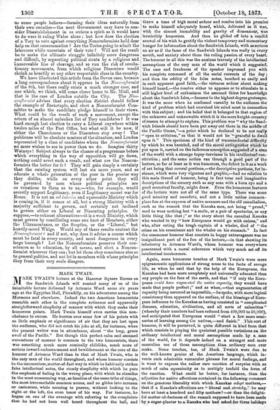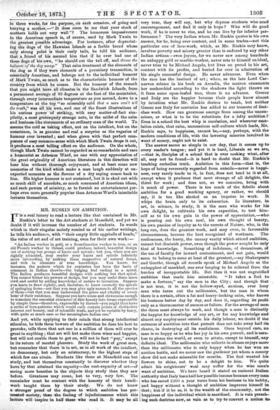MARK TWAIN.
iurARK TWAIN'S lecture at the Hanover Square Rooms on in the Sandwich Islands will remind many of us of the inimitable lecture delivered by Artemus Ward some six years ago at the Egyptian Hall, Piccadilly, on his adventures among the Mormons and elsewhere. Indeed the two American humourista resemble each other in the complete reticence and apparently straightforward simplicity of manner with which they make their humorous points. Mark Twain himself even carries this non- ohalance to excess. He harries over some few of his points with so little emphasis or significance of air that they are lost upon the audience, who did not catch his joke at all, for instance, when the present writer was in attendance,' about "the long, green swell of the Pacific." But though this perfect calm and assumed earnestness of manner is common to the two humourists, there was something much more comically childlike, much more of serious inward embarrassment and bewilderment at the core of the humour of Artemus Ward than in that of Mark Twain, who is the easy man of the world throughout, and whose humour consists in the unconscious, matter-of-fact way in which he habitually strikes false intellectual notes, the steady simplicity with which he pats the emphasis of feeling in. the wrong place, with which he classifies in the most unassuming way, as families of the same tribe of things, the most irreconcilable common nouns, and so glides into sarcasm or caricature, while seeming to pursue, without looking to the right or the left, the even tenor of his way. For instance, he began on one of the evenings with referring to the complaints that he had not been well heard throughout the hall, and threw a tone of high moral ardour and resolve into his promise to make himself adequately heard, which, delivered as • it was,
with the utmost immobility and gravity of demeanour, was
irresistibly humorous. And then he glided off into a candid avowal of his wish to gratify the violent temporary and momentary hunger for information about the Sandwich Islands, with as serious an air as if the fame of the Sandwich Islands was really in every mouth, and anxiety about them the ruling passion of every heart. The humour in all this was the anxious travesty of the intellectual assumptions of the easy man of the world which it suggested. The ease and frankness of the speaker impressed you with his complete command of all the social currents of the day ; and then the oddity of the false notes, touched so easily and in such apparent good faith,—the virtuous ardour about making himself heard,—the resolve either to appease or to stimulate to a still higher level, of enthusiasm the assumed thirst for knowledge about the Sandwich Isles,—became lathe highest degree grotesque. It was the same when he confessed casually to the audience the kind of problem which had exercised his mind most in connection with this subject ; and his belief that it belonged to that region of the unknown and unknowable which it is the mere knight-errantry of reason to attempt to explore. This problem was "why the Sand- wich Islands should have been put away out there in the middle of the Pacific Ocean,"—a point which he declared to be not really "open to criticism," so that it would not be "graceful to dwell upon it." This specimen of the kind of transcendental difficulty by which he was haunted, and of the moral extinguisher which he put upon it, carried on the ludicrous conception suggested of a man of the world with a strange topsy-turviness in his intellectualcon- stitution ; and the same notion ran through a good part of the lecture, so far at least as it was humorous, the defect in it as a work of art being that several portions,—the descriptive portions, for in- stance, which were very vigorous and graphic,—had no relation to this main thread of humour, being in fact terse and imaginative descriptions of the scenery such as any man with a keen eye and a good oratorical faculty, might draw. Even the humorous features of the lecture were not all of the same type. There was some good mimicry and anecdote, and not a little rather common- place fun at the expense of native manners and the old cannibalism, such as the remark that the Kanaka men, not being "proud," used to wear nothing, but "a smile, or a pair of spectacles, or any little thing like that ;" or the story about the cannibal Kanaka who wanted to try "how Europeans would go with onions," and whop after eating the tough captain of a whaler, died of "the crime on his conscience and the whaler on his stomach." In fact the commoner humour that consists in happy extravagance was no insignificant part of the fun of the lecture,—in that showing its inferiority to Artemus Ward's, whose humour was everywhere penetrated with a moral coherence which very much set off its intellectual incoherence.
Again, some humorous touches of Mark Twain's were mere epigrammatic applications of strong sense to the facts of savage life, as when he said that by the help of the Europeans, the Kanakas had been more completely and universally educated than any people on the face of the earth, and that "if only the Euro- peans could have augmented the native capacity, they would have made that people perfect ;" and as when,—that augmentation of capacity being assumed as impossible, —he spoke, with more logical consistency than appeared on the surface, of the blessings of Euro- pean influence to the Kanakas as having consisted in "complicated diseases, education, civilisation, and all soda of calamities" (whereby their numbers had been reduced from 400,000 to 50,000), and anticipated that Europeans would "start a few more semi- naries of learning among the natives,—and Rajah." This sort of humour, it will be perceived, is quite different in kind from that which consists in playing the quaintest possible variations on the ordinary intellectual and moral assumptions made by a man of the world, for it depends indeed on a stronger and more masculine use of those assumptions than ordinary men ever make. Some touches, too, of Mark Twain's were due to the well-known genius of the 4merican language, which in- vents such admirable vernacular phrases for moral feelings, and is wont to express the rather rare emotion of surprise with so much of calm equanimity as to multiply tenfold the force of the emotion. What could be better, for instance, than the adjective for native affections contained in the following comment on the generous liberality with which Kanakas adopt mothers,— that if a Kanaka's affections are "liberal and stretchy," he may have at least a hundred and fifty mothers ?—or than the delight- ful matter-of-factness of the remark supposed to have been made by a sugar-planter to a Kanaka who bad asked for three holidays
in three weeks, for the purpose, on each occasion, of going and burying a mother,—" It does seem to me that your stock of mothers holds out very well "? The humorous impassiveness in the American speech is, of course, used by Mark Twain to the greatest possible advantage. For instance, after depreciat- ing the dogs of the Hawaian Islands as a feeble breed whose only strong point is their curly tails, he told his audience, that a friend of his assured him that if he ever had one of these dogs of his own, "he should cut the tail off, and throw the balance of the dog away." That calm treatment of the elements of the dog as if they were elements of a pecuniary transaction, is essentially American, and belongs not to the individual humour of Mark Twain, so much as to the characteristic humour of the country from which he comes. But the humour of the remark that you might have all climates in the Sandwich Islands, from a permanent average of 80 degrees at the foot of the mountains, through every intermediate temperature as you ascend, down to a temperature at the top "so miserably cold that a man can't tell the truth," was all his own, and one of the finest illustrations of his curious power •of striking, with easy matter-of-fact sim- plicity, a most grotesquely strange note, in the midst of the calm and business-like statements of an ordinary man of the world. To assume the cold as taking effect, not on the intellect, but on the conscience, is as genuine and real a surprise as the vagaries of humour ever invented ; and when given with that perfect com- posure of easy common-sense with which Mark Twain drops it out, it produces a most telling effect on the audience. On the whole, though Mark Twain cannot be regarded as so remarkable and rare a humottrist as Artemus Ward, no one with any appreciation of the great originality of American literature in this direction will hear him without thorough enjoyment, and at least some new memories of the kind which make a man laugh suddenly at un- expected moments as the flavour of a dry saying comes back to him. His higher humour is not sustained, but it is eked out with so much skill of anecdote, so much command of American idiom, and such powers of mimicry, as to furnish an entertainment per- haps even more generally popular than Artemus Ward's inimitable lectures themselves.



































 Previous page
Previous page